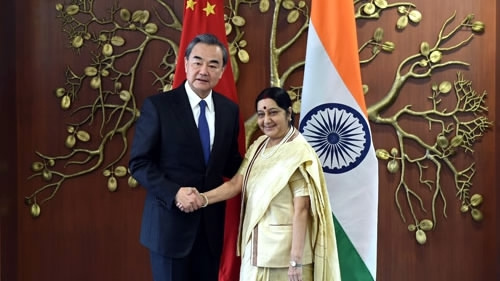
Chinese Foreign Minister Wang Yi meets his Indian counterpart Sushma Swaraj in New Delhi, Dec. 11, 2017. (Photo/CGTN)
The relationship between China and India is not satisfactory in 2017, though it has maintained an overall trend of development, Chinese Foreign Minister Wang Yi told his Indian counterpart Sushma Swaraj on Monday.
During a bilateral meeting with Swaraj on the sidelines of the 15th Meeting of the Foreign Ministers of Russia, India and China (RIC) in New Delhi, Wang urged India to learn lessons from the two countries' military standoff in the border region of Dong Lang (Doklam).
On June 18 this year, more than 270 armed Indian troops with two bulldozers crossed the boundary in the Sikkim sector and advanced more than 100 meters into Chinese territory to obstruct routine road construction in the Dong Lang area of southwest China's Tibet Autonomous Region. The crisis ended on August 28 after Beijing confirmed the withdrawal of India's trespassing personnel and equipment.
Wang said the bilateral ties went through a serious test after the incident. Although the standoff was resolved peacefully through diplomatic means more than two months later – which showed the growing maturity of the bilateral ties – lessons must be learned and efforts must be made to avoid such an incident in the future, he stressed.
China-India ties are currently in a critical period and mutual trust is important for the development of the relationship, Wang added.
"If China and India speak with one voice, the whole world will listen," he said.
Swaraj said despite some challenges for the bilateral relations, India and China have been developing their ties in a steady manner on the whole. The resolution of the Dong Lang standoff through diplomatic means showed political wisdom of the two sides, she noted.
The Indian foreign minister said her country holds the view that India and China share more common grounds than differences, thus the two sides should enhance strategic communication, promote strategic mutual trust so as to prevent differences from evolving into disputes and avoid disputes deteriorating into conflicts.
India is committed to properly managing differences and working together to maintain peace and tranquility in the border areas, she added.
Russia as a mediator between China and India
Wang told Swaraj that China and India should regard each other's development as opportunities rather than challenges, stressing that the two countries are partners rather than rivals.
He called on the two sides to enhance strategic communication at all levels, restore dialogue mechanisms that have been established and deepen pragmatic cooperation in all fields.
Wang made the remarks in response to India's concerns over the China-proposed Belt and Road Initiative, which comprises of the Silk Road Economic Belt and the 21st Century Maritime Silk Road.
India is concerned about the China-Pakistan Economic Corridor (CPEC) – a flagship project of the initiative – that passes through land controlled by Pakistan but also claimed by India.
In his address to the press after the 15th RIC Foreign Ministers' Meeting, Wang called on the three countries to speed up the alignment of their development strategies and policies.
Russian Foreign Minister Sergei Lavrov also urged India to join the Belt and Road Initiative. "India, I am 100 percent convinced, has enough very smart diplomats and politicians to find a way which would allow you to benefit from this process," he said.
The initiative, with the principle of achieving shared growth through discussion and collaboration, is aimed at benefitting all nations and peoples along the ancient trade routes of Silk Road, Wang said during a separate meeting with Indian National Security Adviser Ajit Kumar Doval.
The Chinese foreign minister also met with Indian President Ram Nath Kovind, who said India is willing to further promote mutual understanding and trust and broaden cooperation with China.
Li Qingyan, an expert on South Asia at China Institute of International Studies, told Xinhua that the trilateral meeting was necessary for China and India to enhance mutual trust and reduce suspicion.
Russia is willing to play a constructive role and act as a mediator between China and India, said Li Yonghui, a researcher at the Institute of Russian, Eastern European and Central Asian Studies of the Chinese Academy of Social Sciences.


















































